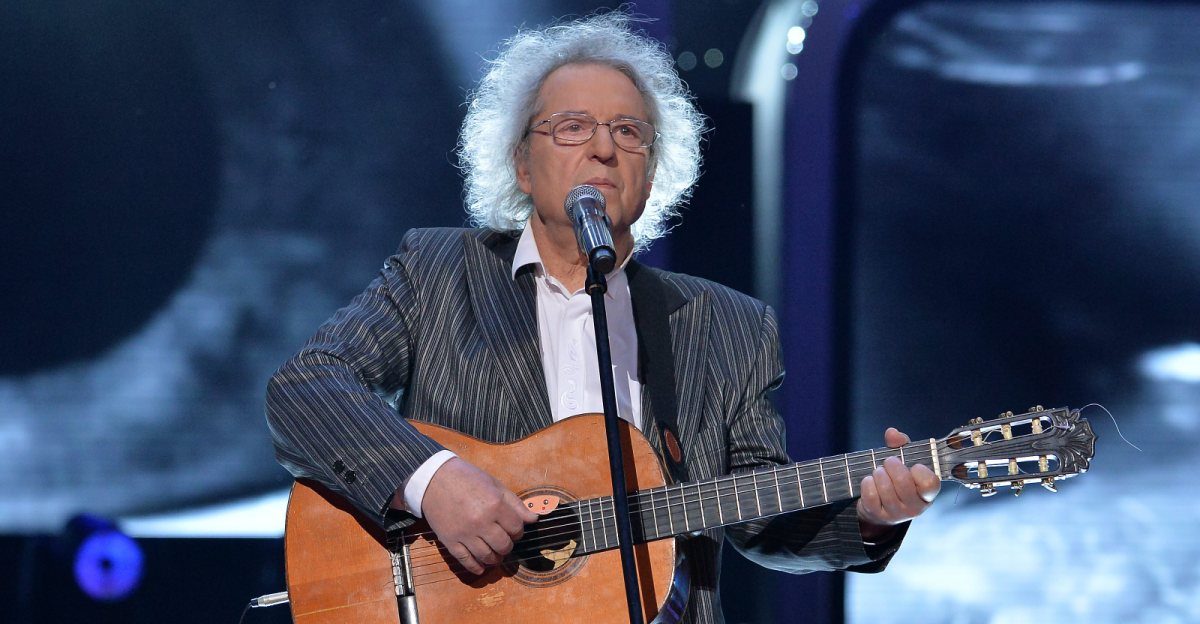Sung poetry in Poland has a long cultural and political history. These songs combine literary depth with melody, weaving together stories of history, philosophy, and social life. They have drawn on traditions from medieval bardic music to cabaret and folk music to modern jazz. The genre has also been part of resistance movements during the long period when Poles were ruled by foreign empires and during the Communist era.
Today, although the genre co-exists and overlaps with many others, it remains an integral part of Poland’s artistic scene, with singers that often double as composers, published poets and novelists, and social commentators and political activists. The following resource will introduce you briefly to the genre and to several Polish artists that have been instrumental in its expression in the modern era. All artists are listed in the approximate chronological order that they appeared, from the Communist era to the modern day.
Introduction to Polish Sung Poetry
Sung poetry (poezja śpiewana) is a broad and fluid musical genre that occupies a unique place in Polish cultural life. At its most traditional, it refers to a poem—often written by one author and set to music by another—that is performed vocally with minimal accompaniment. In practice, however, the label encompasses a wide range of songs that are valued for their lyrical depth, narrative power, or philosophical resonance. These works often draw on themes of history, literature, politics, and human experience, blurring the line between poetry and song. For this reason, sung poetry can overlap with related forms such as bardic song (piosenka autorska), campfire songs, folk songs, and cabaret performance.
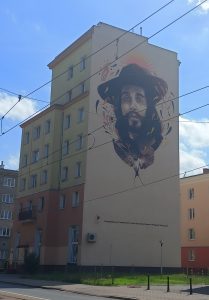
The genre exists in many cultures, but often in different forms and with different names. Music from comparable figures in the English-speaking world such as Leonard Cohen, Bob Dylan, Tom Waits, Nick Cave, and Bruce Springsteen is often classed as folk, rock, blues, or even “experimental” in the US, although they would be seen as sung poetry in Poland.
Poland’s tradition of combining poetry and music has deep historical roots. As in the ancient Greek world, where Homeric epics were sung to instrumental accompaniment, medieval and early modern Poland had traveling bards who recounted history and current events through song, often accompanied by a hurdy-gurdy. Modern sung poetry draws from these bardic traditions but also from twentieth-century influences such as cabaret and folk revival movements. Many of Poland’s most prominent performers began their careers in theatrical or cabaret settings, where musical storytelling and literary wordplay were intertwined. Over time, sung poetry also absorbed elements of jazz, rock, and even opera, evolving into a versatile genre that moves freely across stylistic boundaries.
That literature and language would be considered especially important in Poland is not surprising. From the late eighteenth century until 1918, Poland disappeared, and the Poles found themselves a stateless minority in empires that often sought to suppress their language and culture. During this period, the Polish language became a crucial vehicle for resistance and continuity, and poetry, literature, and song became tools of cultural preservation and even campaigns to reestablish sovereignty.
During the Communist period, sung poetry again served dissident movements. Artists often used allegory and metaphor to critique the authorities while skirting censorship. In 1981, for example, the Solidarity movement organized the First Review of Genuine Song, popularly known as the “Festival of Forbidden Songs,” as a direct challenge to the authorities and censorship. Many songs at that festival, which drew an audience of over 18,000 people, were examples of sung poetry.
Today, sung poetry remains an active and evolving art form in Poland. Annual festivals and concerts continue to draw both established artists and younger performers. There is even a specific award in the annual Fryderyk Awards for Best Sung Poetry Album. Encompassing both global and distinctly Polish influences, sung poetry endures as one of the most vital expressions of Poland’s artistic and cultural identity as well as, often, political protest.
Czesław Niemen
Biography by Garrett Lewis
Czesław Niemen’s career flowed across artistic mediums and musical genres. He began as a sweet-voiced bel canto, but, with time, became an iconic rock “howler” also known as a composer, lyricist, and multi-instrumental performer. His iconic voice coupled with his colorful, eccentric fashion made him one of the most charismatic and recognizable performers in Poland over his decades of work.
Born Czesław Juliusz Wydrzycki in present-day Belarus, 1939, he showed an early love of music. In his childhood he played the organ at church, sang in school and church choirs, and studied the accordion, piano, and bassoon. His family repatriated to Poland in 1958 as part of a significant immigration of Poles absorbed into the USSR after WWII.
Settling in Gdańsk in 1960, he began playing international hits in multiple languages such as “Malaguena Salerosa”, which placed him in the top 10 at the 1st Young Talent Festival in Szczecin and earned him a spot touring with Czerwono-Czarni, then one of Poland’s most popular youth bands.
His first ever released recording was the 1962 French-language single “Farewell Sadness” (“Adieu Tristesse“). That same year, while playing intermissions for the band Niebiesko-Czarni, he met big beat promoter Franciszek Walicki, who thought Czesław’s repertoire out of touch with Polish youth, but also saw great potential in the young artist.
Working with Walicki and Niebiesko-Czarni, Czesław gravitated towards rock, such as the American hit “Locomotion,” recorded in English in 1964 as part of a mini-album. The album also contained the Motown-reminiscent “Do You Remember Me?” (“Czy mnie jeszcze pamiętasz?”), later covered by German-American actress Marlene Dietrich.
Touring abroad and discovering that international audiences struggled with his surname, Czesław adopted the pseudonym Czesław Niemen, after a river in his homeland. International touring also introduced him to cutting edge European fashions and he began to dress colorfully and wear wigs.
In 1966, he collaborated with the Michel Colombier Orchestra to produce Dream of Warsaw (Sen o Warszawie; also marketed as Niemen). This marked a major turn to his full-throated “howler” style and polished, soaring arrangements. The title track, a dreamy tour of Poland’s capital, also became his most popular hit. It is now sung by Warsaw soccer fans before matches as an anthem.
In 1967, Niemen and the band Akwarele released the collaborative Strange is this World (Dziwny jest ten świat). The title song, which became a signature hit, is a peace movement anthem, powerfully sung by Nieman, that encourages the listener to become the change they want to see in the world. A second song from the album, Memory (Wspomnienie), a lyrical love song, is also an enduring hit.
Niemen’s experimentation with progressive rock and soul continued with Success (Sukces), a second album recorded with Akwarele that included the hit “Burning Barn” (“Płonąca Stodoła“), a classic party song with big band instrumentation. This album and its accompanying concerts were immortalized in a short documentary directed by Marek Piwowski, which, unfortunately, was influenced by the communist authorities in an attempt to dampen Niemen’s popularity by making him look simple and conceited.
In 1970, Niemen released the album Enigmatic (titled in English) with his newly-founded Nieman Enigmatic band. The four-song album, Niemen’s most commercially successful, blends psychedelic and progressive rock, jazz, blues, and Avant-garde as well as, in the track “Bem’s Funeral Rhapsody in Memory” (“Bema pamięci żałobny rapsod“), poetry from Cyprian Kamil Norwid. This was the first of many sung poetry works by Niemen drawn from Norwid’s poetry.
In 1974, with his new Aerolit band, Niemen began experimenting heavily with electronic instruments like the Hammond Organ and Moog Synthesizer. This came to fruition with the highly experimental psychedelic album Catharsis (Katharsis) in 1976.
Niemen focused more on touring and, over the 1980s, began to retreat more into himself. His final albums, 1989’s Terra Deflorata and 2001’s From Under the Hat (Spodchmurykapelusza) continued to show experimentation with electronic music, while also bringing in folk influences and instruments.
Throughout his career, communist authorities targeted Niemen, at times trying to suppress his popularity, at others twisting his words to suggest support for the regime. This occasionally worked; at a 1980s concert in Chicago, Polish immigrants booed and pelted him with plastic bottles after a manipulated quote aired on state news made it seem he endorsed Poland’s martial law. Despite this, his reputation endures as that of a phenomenally talented musician, an eccentric yet sensitive artist, and a largely apolitical advocate for peace and freedom.
Niemen passed away in 2004 after a long battle with lymphatic cancer. His ashes were interred at Warsaw’s Powązki Cemetery at a ceremony attended by thousands of fans, family, and friends. He remains regarded as one of Poland’s greatest modern musicians.
Ewa Demarczyk
Biography by Garrett Lewis
Ewa Demarczyk was known for her captivating and charismatic voice, coupled with inventive compositions and a striking stage presence. Singing of loss and mourning, joy and hope, Demarczyk opened the emotional floodgates for a generation of Poles who felt silenced by the horrors of the war. She always performed in a simple black dress with sharply lined eyes. She barely moved while she performed, to let her voice and songs do the work. Demarczyk only recorded three studio albums and performed consistently just between the mid-1960s and late 1970s before moving onto other pursuits and eventually retiring from public view.
Ewa Demarczyk was born in Kraków in 1941. Originally interested in a range of subjects, including architecture, she settled on music and acting. She studied piano at the Krzyzstof Penderecki Academy of Music in Kraków and then acting and singing at the Stanisław Wyspiański Academy of Theater Arts.
In the early 1960s, Demarczyk started performing at the Kraków student cabaret Cyrulik where, in June 1962, the composer Zygmunt Konieczny heard her sing. The two would go on to multiple collaborations, mostly in sung poetry with Demarczyk expertly interpreting Konieczny’s compositions. With one of these, “Carousel with Madonnas” (“Karuzela z Madonnami“), based on a work by Miron Białoszewski, she won second place at the First National Student Song Festival in Kraków. Konieczny would also earn her a place at the prestigious Cellar Under the Rams (Piwnica pod Baranami).
At the 1963 First National Song Festival in Opole, she performed “Such a Landscape” (“Taki Pejzaż”) and “Black Angels” (“Czarne Anioły”), drawn from the poetry of Andrzej Schmidt and Wiesław Dymny, respectively, and earned first prize. “Such a Landscape” is intense and Demarczyk worked on it for six months before its debut. The song builds an aching emotional image, in which memories of family roots, love, and loss hang almost ethereally in the air. Her performance transformed her from a local Kraków talent into a national star.
She turned her first three songs into her first studio LP, Karuzela z Madonnami, and was invited to the International Song Festival in Sopot as a laureate. There, she met Bruno Coquatrix, director of Olympia Hall in Paris. She put off his offer to sing there for nearly two years, as she wanted to finish her studies, and then declined a two-year contract to perform there, allegedly because she did not want to perform in French. This would remain a core value of Demarczyk’s: she felt like songs derived from Polish poetry were meant to be performed in Polish.
Throughout the mid-1960s, Demarczyk continued to win awards for her performances at festivals and began to tour globally, reaching locations like the United States and Australia. In 1964, she won second prize for “Big Bright Ball” (“Grande valse brillante”) at the Sopot Festival and another for “War Poems” (“Wiersze wojenne”), with lyrics from Krzyzstof Kamil Baczyński, a poet killed in the Warsaw Uprising. The song was a powerful anti-war piece that became a symbol of hope.
Demarczyk and Konieczny began to grow apart. Some posit this stemed from the 1967 studio album Ewa Demarczyk śpiewa piosenki Zygmunta Koniecznego (Ewa Demarczyk sings songs of Zygmunt Konieczny). She was reportedly unhappy with the darkness of her voice post-editing, although despite her concerns, the album went platinum. Most likely, however, she simply wanted to try new things as she had recently also just graduated. She began working with composer Andrzej Zarycki and performing non-Polish poetry like that of Osip Mandelstam, Marina Tsvetaeva, and Goethe. She performed these pieces in the original languages, such as “Nearness of the Beloved” (“Nähe des Beliebten”) from the poem by Goethe of the same title.
She began giving more performances abroad throughout the 1970s, including in the Soviet Union. In 1975, she released her second studio album, Ewa Demarczyk (Эва Дэмарчик), with the Soviet label Melodia. Given her early commitment to performing Polish poetry in its original language, this project sits strangely in her body of work, as she translated four pieces of Polish sung poetry into Russian. However, the album sold a reported 17,000,000 copies. This popularity in the Soviet market was likely thanks to her interpretations of poems by Osip Mandelstam, such as “Violinist Hercowicz” (“Жил Александр Герцович“), which were censored by Soviet officials. She continued performing globally, but her final album, the double concert Ewa Demarczyk – Live, marked a soft end to her public career. Her appearances, growing increasingly sparse, ended in 1999 with a final concert in Poznań.
Demarczyk instead fulfilled her lifelong dream of owning a theater, running the State Theater of Music and Poetry in Kraków from 1986 on. After the fall of communism, however, the city asked her to merge her company with another and move to that theater. Demarczyk refused and her theater was shut down. She then disappeared from the public eye. She had rarely given interviews during her career, but now she was virtually erased from public view. When Ewa Demarczyk passed away on August 14, 2020, Poland lost a truly unique figure, a Black Angel who conveyed emotions many Poles knew but felt they couldn’t publicly express.
Tadeusz Woźniak
Biography by Elizabeth Ray
By pushing artistic boundaries where he could, and by avoiding censorship where he had to, singer, composer, and guitarist Tadeusz Woźniak created an ever-evolving sound that spanned decades, genres, and mediums. He was a whirlwind of creative energy who collaborated with many other artists and blurred the lines between song, literature, and theater.
Born in Warsaw in 1947, Woźniak showed early talents for violin and ballet, but went on to study electrical engineering. While in technical school, he discovered a passion for the guitar and rock music. In 1965, Woźniak joined The Savages (Dzikusy), a Polish rock band, under the name Daniel Dan. Stage names were common at this time as, if one’s musical activities sparked the interest of a censor, it could cost them a place at school and potential future employment.
The Savages’ popularity skyrocketed with the arrival of Woźniak, and they were invited to perform on the radio, at festivals, and on a nationwide tour. The cyclical electric guitar melody and subtle percussion of songs like their 1966 “For Better or Worse” (“Na dobre i złe“) reflect the inspiration they drew from early English rock bands like the Rolling Stones, the Kinks, and the Animals.
In 1967, Woźniak joined the group Four (Czterech), with whom he set to music works such as “The Hunchback” (“Garbus“), by interwar-era poet Julian Tuwim. “Hey, Hanno” (“Hej, Hanno“), with lyrics from a poem by Agnieszka Osiecka, became a major success after performances at the National Festival of Polish Song in Opole and the Television Song Exchange Contest. “Hey, Hanno” displays clear jazz and balladic folk influences that scaffold Osiecka’s poetic motifs of nature, distance, and forbidden love.
Throughout the late sixties and early seventies, Woźniak worked with many other legends of his genre, including Czesław Niemen and lyricist Jerzy Juliusz Emir. Many of his songs were self-written, thus also placing Woźniak in the “author’s song” (piosenka autorska) or “bard” genre. Though not often overtly political, in the midst of the violent suppression of the Prague Spring in 1968, Woźniak wrote the pacifist ballad “It Will Be a Son” (“To będzie syn,” sometimes written as “To być syn”), in which a father sings of the birth of his son in the context of the knowledge that the infant will one day be sent to war. The song was banned, with the censor decrying it as “a knife in the back of Polish soldiers intervening in Czechoslovakia.”
Woźniak released another signature hit in 1971, his self-written “The Taste and Smell of Oranges” (“Smak i zapach pomarańczy“), which remains popular for its poignant dichotomy between lyrical musings on the passage of time and its jaunty, youthful chorus and melody.
The defining moment of Woźniak’s career came with the release of his self-titled album in 1972, on which the massively popular “The Purple Clockmaker of Light” (“Zegarmistrz światła purpurowy“) is the final track. Adapted from text by poet, artist, and philosopher Bogdan Chorążuk and with backing vocals by the all-female band Alibabki, “Clockmaker” won the main prize at the 10th National Festival of Polish Song in Opole that year. Today one of the most important and beloved examples of sung poetry, it is composed of only eight repeated lines that illustrate a man contemplating his own mortality. This short and simple refrain builds from soft and acoustic to loud and assertive before returning again to quiet reflection.
By the mid-1970s, Woźniak had transitioned almost entirely to working with theaters. This was not an uncommon arrangement for musicians under communism, who found that theaters could not only provide them with steady income, but also organizational support against the kind of backlash from the censor that Woźniak experienced in the wake of 1968. Initially invited to compose music for a single production in 1973, he found a second calling in the theater and proceeded to write the album Shade of Silence (Odcień ciszy), which he then turned into a theatrical production with the Polish Theater in Poznań.
Woźniak then spent two decades in theaters from Poznań to Bydgoszcz, Opole, and Wałbrzych. He became sought after for his ability to encapsulate the narrative of the stage in his music, much in the same way he did with poetry. One of this most popular efforts was the children’s album Moomin Summer (Lato Muminków), for which he composed music for text written by “Clockmaker” poet Bogdan Chorążuk, based on the still-popular Moomin characters created by Finnish writer Tove Jansson. Over this time, many of his other theatrical compositions were also released as albums.
In 2003, Woźniak made a return to sung poetry with the album Polish Ballads (Ballady polskie), which features songs based on the works of classical Polish writers such as Adam Mickiewicz, Juliusz Słowacki, and Bolesław Leśmian. One of Woźniak’s final notable works, the 2013 song “Mamela,” was dedicated to his son Filip, who was born with Down syndrome. Woźniak was active in raising awareness about that condition as he continued to write music, give concerts, and appear on television and radio for the rest of life.
Tadeusz Woźniak died unexpectedly in Warsaw in July of 2024 while still in the midst of planning several new musical efforts. Still, his most cherished music lives on. Those passing by the grave of the Clockmaker, as he was known, will often notice it lovingly adorned with oranges.
Marek Grechuta
Biography by Rachel Kelly
Marek Grechuta was lauded for his theatrical style, expressive delivery that often bordered on spoken word, and for his exceptional ability to adapt poetry, literature, and other art into song. Now a household name, Grechuta’s legacy continues to resonate as a reflection of Polish identity and culture, leaving a lasting influence on the national consciousness.
Born in 1945, just after the end of WWII, Grechuta received his first music lessons from a church organist and, by the age of seven, was learning to play the piano. Despite an obvious musical talent, Grechuta studied architecture at the Kraków University of Technology. He became acquainted there with composer Jan Kanty Pawluśkiewicz and joined the student cabaret Anawa (from the French “en avant,” meaning “forward” or “ahead”), in 1966. The cabaret, which some members described as “fair and circus art, with breaks for lyrical songs,” soon became a proper musical group, with Grechuta as its lead vocalist. Anawa won the Grand Prix for best song with “Tango Anawa” and Grechuta took second place overall with the same song in the nationally televised Sixth Student Song Festival in Kraków in 1967. The band went on to win various awards at the National Festival of Polish Song in Opole from 1968 to 1971. Through Anawa, Grechuta met his future wife, Danuta, whom he would marry in 1970.
Anawa’s 1970 debut album, Marek Grechuta & Anawa, set to music the works of Grechuta and multiple poets from the Young Poland Movement, an artistic force that embraced the Decadence, Neo-romantic, Symbolist, and Impressionist movements from 1890 to 1918. Grechuta’s vocals were accompanied by theatrical musical arrangements by Grechuta and Pawluśkiewicz, featuring an array of instrumentation including the guitar, violin, cello, and double bass as well as collaboration with guest musicians such as the Alibabki female vocal ensemble. The album contains one of his best-known hits, “Don’t be a Jerk” (“Nie dokazuj“), a jaunty ditty that urges the listener to remain humble and achieves surprising poetic depth in its lyrics.
Unlike the straightforward and romantic style of Anawa’s first album, their second album, Pageant (Korowód), delved more into the avant-garde and deeper into the group’s theatrical roots. The album incorporates folk, rock, and jazz with often fast-paced vocals from Grechuta and an ensemble of singers. The titular song, winner of the Grand Prix award at the 1971 National Festival of Polish Song, featured a commanding flute solo amidst a backdrop of jazz-rock improvisations. Another song on the album, Days We Don’t Know (Dni, których nie znamy), became Grechuta’s signature hit. It would go on to be covered by an array of well-known Polish artists, and become the unofficial anthem of the Korona Kielce football club.
Due to artistic differences amongst bandmates, Grechuta left Anawa in 1971 to found WIEM, an acronym for “W Innej Epoce Muzycznej” or, in English, “In Another Musical Epoch.” WIEM produced two albums, The Road Beyond the Horizon (Droga za widnokres), released in 1972, and Magic of the Clouds (Magia obłoków) in 1974. Both were known for exquisite instrumental explorations of electric guitar and keyboards characteristic of progressive rock, buttressed by the bold syncopated percussion of jazz.
In 1975, Grechuta left WIEM to once again collaborate with Pawluśkiewicz and Anawa, returning to his previous acoustic style. The group produced a myriad of pieces together, including a musical adaptation of Stanisław Ignacy Witkiewicz’s play, The Crazy Locomotive (Szalona lokomotywa).
Grechuta then left again to join the well-known literary cabaret, Cellar Under the Rams (Piwnica pod Baranami) in 1976. This nearly decade-long collaboration produced a handful of concept albums that adapted the works of modern Polish poets such as Tadeusz Nowak on the 1979 Songs by Marek Grechuta to Words by Tadeusz Nowak (Pieśni Marka Grechuty do słów Tadeusza Nowaka) and Bolesław Leśmian on the 1984 In the Raspberry Bush (W malinowym chruśniaku). Grechuta also musically interpreted paintings by famous artists such as Van Gogh and Monet and scenes from Shakespeare’s Othello on Singing Images (Śpiewające obrazy, 1981).
Ten Important Words (Dziesięć ważnych słów), released in 1994, contained considerable social commentary, with each song covering a subject Grechuta personally believed to be a central moral concept. For example, the song Homeland (Ojczyzna), contained lines such as “…without the wisdom of science, the nation will turn into a nameless country,” and the song Nature (Natura) with “…the Earth is still giving birth, faithful to the end. She is for us people who torment her.”
Grechuta developed bipolar disorder as a young man, a condition that deeply impacted his life onstage and at home. Predisposed to long stretches of depression, he was known to suddenly walk out of a rehearsal or simply not attend. He constantly oscillated between pride and loathing for his art.
In the last decade of his life, Grechuta struggled with a terminal illness and its treatment, a fact he and his family kept private, never officially releasing the exact nature of the illness to the public. His physical condition further exacerbated his mental health challenges. Fans witnessed Grechuta’s lapses during live performances, such as forgetting song lyrics or suddenly ending his performance in the middle of a set. This was widely and incorrectly attributed to alcoholism. Grechuta retreated from society after his adult son, Łukasz, went missing in 1999. After two years and a nationally televised appeal from his parents, it was finally uncovered that Łukasz had set off on foot to complete a popular Catholic pilgrimage, walking from Santiago de Compostela, Spain to Rome. He had not told anyone of his plans.
Temporary health improvements allowed Grechuta to release a final album in 2003, Extraordinary Places (Niezwykłe miejsca), dedicated to various world cities that had enchanted him.
Grechuta passed away on October 9, 2006 from circulatory failure. At his funeral, fans serenaded the procession to Krakow’s Rakowicki Cemetery, where he was laid to rest and commemorated by his longtime collaborator and friend, Jan Kanty Pawluśkiewicz, and his beloved wife, Danuta.
Andrzej Sikorowski (and Pod Budą)
Biography by Izzy Moore
Andrzej Sikorowski is a Polish folk poet, singer, and composer whose career spans over five decades. His lyrics are deeply reflective and narrative, often telling poignant stories of everyday life, relationships, and the passage of time. He is also talented as a singer, guitarist, and composer, with the technical mastery to bring those stories to life through music.
As a solo artist, collaborator, and longtime leader of the band Pod Budą, he has achieved multiple gold and platinum records. Distinct from many contemporaries, Sikorowski’s artistic identity has rested on continuity rather than reinvention. He has maintained his style and compulsion for protest even after the fall of communism and the rise of the lucrative commercial music industry.
Born in 1949 in Kraków, Poland’s culturally-rich “second capital,” he went on to study philology at Jagiellonian University in the early 1970s, where he began writing and performing sung poetry. He won first prize at Kraków’s Student Song Festival in 1970 and the FAMA Festival in 1971 with “New Year” (“Nowy Rok”). His talent led to work composing for television and, in 1975, teaming up with singer-activist Bohdan Smoleń at the Pod Budą cabaret. Supported by the theater, the now-legendary band named itself after its birthplace, whose name translates loosely as “Under the Peasant Hut.”
The band’s national breakthrough came with “A Very Sad Retro Song” (“Bardzo smutna piosenka retro”), performed at the 1979 National Festival of Polish Song in Opole. Its satirical lyrics and lively folk sound were well-received and would become a central part of the band’s style. During the late 1970s and 1980s, Pod Budą gave up to 250 performances annually.
Their 1980 debut album Pod Budą included several of Sikorowski’s best-known compositions, among them “A Very Sad Retro Song” and “The Ballad of Aunt Matylda” (“Ballada o ciotce Matyldzie”), as quirky in its narrative as in its melody and instrumentation, about the life and death of a nosy cat lady.
Their 1983 album Postscript (Postscriptum) was released under martial law with some lyrics censored. These included metaphorical references on the song “O la ri ja” discussing the disbandment of the Military Council of National Salvation, the institution that had declared Poland’s martial law and then controlled the country.
Sikorowski’s writing evolved through the political transformations of the 1980s and 1990s. Pod Budą’s 1990 album, But For Now We Live (Lecz póki co żyjemy), eventually reached gold status. Sikorowski also began collaborating with pop icon Maryla Rodowicz. Their 1991 duet “Scandal” (“Skandal”) critiqued modern consumerism’s replacement of folk culture, while the 1992 composition “But it Already Happened” (“Ale To Już Było”) offered a reflection on life after communism.
In 1993, Capitalism Like Capitalism (Jak kapitalizm to kapitalizm) became their first platinum album. The title track skewers musicians who altered their styles to serve commercial markets. Meanwhile, Don’t Move Our Capital to Kraków (Nie przenoście nam stolicy do Krakowa) talks about how some politicians still harken back to the Piast Dynasty in the 16th century, when Krakow was the Polish capital, and Poland had entered its golden age. The song urges them to instead consider the present and its very different problems to solve.
As the 2000s approached, Sikorowski turned toward family as an inspiration and constant theme in his work. Pod Buda’s platinum-rated 1998 album Sorry For… (Zal Za…) opens with “My Two Homelands” (“Moje dwie ojczyzny”). For Sikorowski this meant Poland and Greece, the homeland of his wife. The family splits its time between the two countries. He also began to collaborate with his daughter, Maja, incorporating Greek language and themes into their joint work. At the same time, he began to move away from Pod Budą.
Although they would continue to tour until 2017, the band released their final album, Together (Razem), in 2001. The album marked Sikorowski’s transition with an exploration of music as a family tradition. It also included contributions from Maja, leading into their colaborative projects.
The Sikorowskis’ first joint album, Krakow-Saloniki, featured songs in Greek and Polish and went gold in 2005. Family Matters (Sprawa rodzinna), exploring identity and fatherhood, reached No. 5 iin the Polish charts in 2010. While the music embraced more jazz and rock elements, it stayed rooted in sung poetry, but centered on Maja’s voice, with Sikorowski in a supporting role.
Sikorowski’s last solo album was Conspiracy with the Clock (Zmowa z Zegarem), released in 2010, which dwelled heavily on aging, social change, and mortality. It was released together with an autobiography, which, in his artistic vision, is meant to act as a supplement and literary analysis of that album, encompassing his legacy. He also released a concert recording from his 2021 50th anniversary televised concert celebrating his career.
Today, Sikorowski has also quietly transitioned to focusing on movie soundtracks, particularly those for children. Maja’s career also continues to blossom.
Jacek Kaczmarski
Biography by Izzy Moore
Jacek Kaczmarski is sometimes known as the “Bard of Solidarity” for his powerful sung poetry and unwavering support for the Solidarity movement. He combined music with original lyrics often infused with allegory and metaphor and inspired by history, literature, and philosophy, creating many memorable hits and some of the Communist era’s greatest protest songs.
Born in Warsaw in 1957, Kaczmarski developed his poetic sensibility under the influence of his father’s academic background and his own studies in Polish philology at the University of Warsaw from 1975 to 1980. His songs followed a style fairly typical of Polish folk singing, often without a chorus, and structured like poetic monologues. While still a student, he won two major student song festivals with works dedicated to the Russian singer-songwriter Vladimir Vysotsky, whose use of allegory and metaphor to avoid censorship profoundly shaped Kaczmarski’s method. His 1977 song “The Flood” (“Oblawa”) inspired by Vysotsky’s song “Wolfhunt” (“Охота на волков”), brought him early recognition.
Kaczmarski’s “Epitaph for Vladimir Vysotsky” (“Epitafium dla Włodzimierza Wysockiego“) won second prize at the 1980 The National Festival of Polish Song in Opole, launching his professional career. While touring in France in 1981, martial law was declared in Poland, prompting him to remain abroad. He would eventually spend much of his time residing in Australia. His subsequent work increasingly intertwined artistic expression and political activism, particularly in support of the Solidarity movement. Collaborating with musicians Przemysław Gintrowski and Zbigniew Łapiński, he released the album Walls (Mury), the title track of which became an anthem of opposition to the regime. Its refrain: “Pull the teeth of the bars from the walls / Break the shackles, break the whip / And the walls will fall, fall, fall”—resonated widely during the 1980s, despite its cautionary subtext about mass interpretation.
1981 also saw Kaczmarski and his collaborators record Scream (Krzyk). Although he himself remained outside of Poland, his main audience was within. Thus, many of his albums were first published in Poland, where censorship was often fickle. In the case of Scream, however, the authorities decided to resolutely ban the album. The master tapes were located and destroyed, though unofficial copies made from an unpolished earlier master circulated in Poland and internationally. The album was not officially released until 1989.
Kaczmarski’s songs frequently drew on historical subjects. His 1986 composition “Katyn” addressed the Soviet execution of Polish officers in 1940 and challenged then-official narratives that tried to attribute the massacre to Nazi forces. The song’s vivid imagery and direct accusation in the lyrics “At dawn in the Katyn forest, the Soviets were shooting at us” anticipated public acknowledgment of responsibility by the Soviets three years later.
Disillusioned by Poland’s condition under martial law, Kaczmarski remained abroad until the political transformations of 1989–1990. Upon returning in 1992, he released Live, which included his legacy-leaving hit “Our Class” (“Nasza Klasa”), a reflection on emigration and generational experience that resonated deeply in post-Communist Poland. The album itself achieved diamond status.
Kaczmarski’s 2000 album Twenty (5) Years Later (Dwadzieścia (5) Lat Później) marked both the twenty-fifth anniversary of his career and the twentieth anniversary of the Solidarity movement, collecting eighteen of his most influential songs and two works from his unreleased album, Mimochodem. These were his final recordings before his death from laryngeal cancer in 2004.
Posthumous releases, including the 2006 seven-disc Supplement, have continued to expand his legacy. Kaczmarski remains recognized as a major figure in Polish musical and literary culture—a bard whose work fused historical reflection, political dissent, and poetic form at a pivotal moment in Poland’s modern history.
Grzegorz Turnau
Biography by Elizabeth Ray
Few Polish musical artists can be credited with a discography as vast as that of Grzegorz Turnau. With a career spanning four decades and counting, he has released seventeen solo albums, collaborated with many celebrated artists, won nine Fryderyk Awards, and given countless performances. His talent for the piano, his dynamic blend of poetic and jazz styles, and his charisma on stage have made him one of Poland’s most beloved working artists.
Turnau was born in 1967 in Kraków, a city that would become the subject of many of his songs. He spent a year in the early 1980s in Bedford, England, with his father, a mathematician. Turnau’s year in the music faculty at the Bedford School shaped his development as a pianist and exposed him to popular music that would later influence his own.
He made his musical debut while still in secondary school, at the 1984 Student Song Festival in Kraków. His ballad “We’re Wandering Again” (“Znów wędrujemy“), adapted from World War II-era poet Krzysztof Kamil Baczyński’s musings on man’s journey through nature, won first prize. Many attributed the seventeen-year-old’s unexpected victory to his vocal and stylistic resemblance to beloved singer Marek Grechuta, whom Turnau has long cited as one of his strongest influences. Grechuta himself, who was on the festival jury, insisted Turnau won because of the maturity and beauty of his song; the enduring popularity of “We’re Wandering Again” is a testament to Grechuta’s assessment.
Turnau studied English at Jagiellonian University through the mid-1980s, drawing inspiration from the likes of E.E. Cummings and Shakespeare as well as numerous Polish poets. He continued to write and perform music, including at the storied Cellar Under the Rams (Piwnica pod Baranami). In 1991, Turnau released his first album, Nothing is Really Happening (Naprawdę nie dzieje się nic), the title track of which ponders how life is given significance only in death.
In 1993, Turnau collaborated with Andrzej Sikorowski’s band Pod Budą (see above) on “Don’t Move Our Capital to Kraków” (“Nie przenoście nam stolicy do Krakowa“), one of what would become many songs about Turnau’s home city. This still-popular anthem kept with Turnau’s folksy melodies of the time but, in disparaging those who looked to the past for political answers, also marked a shift toward more outward social commentary in the post-Communist era.
That same year, Turnau released his second album, Against the Light (Pod światło). It features five songs built around the verses of poet Ewa Lipska, as well as the highly recognizable “Cichosza.” With lyrics by frequent collaborator Michał Zabłocki, “Cichosza” laments the lack of role models and direction available to the young generation coming up in Poland.
1995’s Here and There (To tu, to tam) went double platinum and features several more collaborations with Zabłocki. In addition to marking Turnau’s stylistic shift towards jazz, the album explores man’s relationship to space and time. The track “Between Silence and Silence” (“Między ciszą a ciszą“) considers life’s meaning as something that resides between the titular silences, while “The Intensity of Consciousness” (“Natężenie świadomości“) muses on man’s ever-evolving personality over that time. The album’s most popular song, “Philistine” (“Bracka“), uses abstract metaphor to juxtapose a monotone life in Kraków with life outside the city. With its musings on stagnation, the song resonated with Poland’s youth and critics alike, and won the Karol Musioł Prize at the 1996 National Festival of Polish Song in Opole.
Turnau’s fourth album, Here I Am (Tutaj jestem), released in 1997, marked a further development in his jazz style and is composed largely of sung poetry. Some songs are based on verses by Zabłocki, while others draw from early twentieth-century poets such as Jan Brzechwa, Jarosław Iwaszkiewicz, and Maria Pawlikowska-Jasnorzewska.
Though Turnau has been applauded for not pursuing commercial hits, some of his songs have nonetheless been highly commercially successful. His fast-paced, sultry 2006 duet “Box of Chocolates” (“Bombonierka“) with Basia Stępniak-Wilk was voted song of the decade in 2009 by listeners of the Polish pop station Radio Jard. In collaboration with the multi-talented Magda Umer in 2010, Turnau released Lullabies (Kołysanki – utulanki), renderings of traditional Polish children’s songs that have become his most popular tracks on Spotify.
Grzegorz Turnau continues to release music and enjoy great critical acclaim. His most recent album, Bedford School (2018), is his seventeenth solo LP. The playful title track describes the formative 1980-81 school year Turnau spent in England, with the rest of the album composed of covers of classic American and British songs that influenced him at the time, including tracks by the Beatles, Billy Joel, and Sting. Even more recently, Turnau was featured on the 2022 song “A Dream Within a Dream” (“Sen we śnie“) by indie-pop singer sanah, with lyrics based on a Polish translation of the Edgar Allen Poe poem of the same name. With this song, Turnau not only bridges generations of Polish singers, he also demonstrates the enduring importance of both his unique voice and sung poetry as an expansive and diverse genre in contemporary Polish culture.
Piotr Bukartyk (Łysy)
Biography by Rachel Kelly
Piotr Bukartyk is known primarily for delivering cultural, social, and political commentary beneath the amusing veil of satire. He sings his own poetry, often with just his guitar for backup. This would place much of his music in the “author’s song” category, often considered an overlapping genre with sung poetry.
Born in 1964 and raised mostly in the smaller city of Gorzów Wielkopolski, Bukartyk is the son of well-known politician and sports activist, Roman Bukartyk. By the age of 16, Bukartyk began competing in sung poetry tournaments. In 1982 and 1983, he took first place in the annual Let’s Sing Poetry National Castle Meetings (Ogólnopolskie Spotkania Zamkowe “Śpiewajmy Poezję”), and also placed at the 1984 and 1985 Student Song Festival in Kraków.
Much of his older self-written, solo-performed material is lost. However, some songs were preserved when televised or included in compilation albums. For example, “Waltz of the Tin Soldiers” (“Walc ołowianych żołnierzyków”) was included on the 1984 live recording The Golden Ten (Złota Dziesiątka) and “Where Are You Going?” (“Dokąd się wybierasz?”) was included on the 1987 anthology For Near and Far (Dla Bliskich I Dalekich), which were compilation albums featuring competition winners. In 1991, Bukartyk won the cabaret category at the National Festival of Polish Songs in Opole with “Penguins” (“Pingwiny”). This would lead to him collaborating with the Under the Aegis (Pod Egidą) cabaret from 1991 to 1997.
Only in 1997 did Bukartyk record the first album of his career, Champagne Verses (Szampańskie Wersety). Perhaps appropriately, he used his first commercial album to lambast commercial albums. Diverting from his usually more-simplistic style, most songs on the album feature cheerful synth-pop beats. In “Reggae for a Young Talent” (“Rege dla młodego talenta”), he begins by telling youth to never give up on dreams of stardom – and ends by telling them that they have a better chance of getting to the moon. The most popular song on the album, “Right to Orgasm” (“Prawo do orgazmu”), is a classic 90s rap anthem in the style of the Beastie Boys.
Bukartyk began collaborating with the rock band Section (Sekcja) in 1998, taking on the stage name “Łysy” (Bald). This collaboration resulted in two albums: the rock-influenced From the Head (Z Głowy) in 1999, and the moodier, mellower Ideals (Ideały) from 2004. Some songs did well on the radio, such as “Małgocha,” from the latter album. This ballad still manages to be humorous while lamenting those who never succeed in a messed-up world where no one cares. However, as a whole, the collaboration with Section never really found its footing and, after two albums, Bukartyk went solo again.
In 2010, he released Thursday to Friday (Z czwartku do piątek), in which he reverted to his classic style of singing with his acoustic guitar, occasionally bringing in other instruments such as the violin or electric organ. Several songs became hits, in particular, “Unfortunately, You Must Have Ambition” (“Niestety Trzeba Miec Ambicje“), “Twine” (“Sznurek”), about recreational marijuana use, and “Women Like These Flowers” (“Kobiety jak te kwiaty”), about a wife losing interest in her husband after years of marriage.
Bukartyk’s most popular album to date, That’s How It Is And That’s That (Tak jest i już), was released in 2012. The album had two charting singles, “A Song with Laundry in the Background” (“Piosenka z praniem w tle”), featuring fellow sung poetry artist Katarzyna Groniec, and “I’m Not Saying Who” (“Nie mówię kto”). Many songs on the album juxtapose two forces, whether that be men and women, like in “Seven in the Morning at the Store” (“Siódma rano w sklepjie”), the individual and the world, like in the title song, or the commoner and their homeland, like in “Poverty with Misery” (“Bida z nędza”). Stylistically, the album utilizes soft rock elements paired with acoustic interludes.
In 2014, Bukartyk charted again with the album Buy Yourself a Dog (Kup sobie psa). Bukartyk brought in elements of country blues (also known as folk blues), a genre characterized by solo vocals, plucked guitar strings, and themes of rural or remote landscapes. At times, Bukartyk included sound elements that evoked the feeling of a desolate place, such as in “Heart on a Stick” (“Serce na patyku”), where a whistling motif imitates stereotypes of the American Wild West. Many songs on the album, such as the title song (now a signature hit for Bulartyk), employ brooding instrumental interludes amidst pessimistic lyrics like, “As for me: yes, I am alone. And I’m even doing well. Believe it or not, I got over it.”
Since 2017, Bukartyk has released two more albums: On the Pernicious Influence of Higher Feelings (O Zgubnym Wpływie Wyższych Uczuć) and Perhaps That’s All (Być Może to Wszystko) in 2020. He continues to collaborate, such as with the charting song “Straight on the Nose” (“Prosto w nos“) with fellow sung poetry stars Magda Umer and Artur Andrus. Another major recent collaboration was the album The Whale Fiutin and Other Stories (Wieloryb Fiutin I Inne Opowiadania) with group Ajagore in 2023. Bukartyk has also dabbled in theater, notably debuting as Van Morrison in a theatrical adaptation of the life of The Doors’ frontman, Jim Morrison, in Rider of the Storm in 2000. He hosted the radio program Pretty Flowers (Ładne kwiatki) on the Trójka broadcast from 2007 to 2009.
Long active in music, Piotr Bukartyk took a while to mature into his current role as a well-rounded and well-known celebrity. Today, he continues to actively release music, give concerts, and create a variety of musical art.
Mirosław Czyżykiewicz
Biography by Garrett Lewis
Composer, poet, singer, and painter Mirosław Czyżykiewicz has performed throughout Poland for nearly four decades. Initially, Czyżykiewicz’s discography was made up of interpretations of his own original poetry with his own compositions, but as his career has wound on, he has branched out to performing works by other great poets, novelists, and composers. As such, he has firmly established himself as a lifelong supporter of the Polish sung poetry genre.
Mirosław Czyżykiewicz, who also performed as Mirek Czyżykiewicz, was born in 1961, to two musical parents in the small town of Gorlice. He started playing the guitar as a teenager and then joined his hometown band, The Last Supper at the Inn Destined for Demolition (Ostatnia Wieczerza w Karczmie Do Rozbójki), shortly after its founding. It performed primarily sung poetry. In 1981, Czyżykiewicz made his performance debut with the band at the National Castle Meetings “Let’s Sing Poetry” (Śpiewajmy Poezję) in Olsztyn. It was also his first opportunity to perform his own original compositions.
Although Czyżykiewicz elected to train as a graphic designer, he continued pursuing poetry and sung poetry as well. In 1986, he began publishing poems in the socio-cultural magazine Radar. Throughout the 1980s, he was also very active in the student artistic movement, winning two laureate prizes in the sung poetry category at the Academic Youth Arts Festival (Festiwal Artystyczny Młodzieży Akademickiej) in Świnoujście in 1986 and 1987.
In these years, Czyżykiewicz collaborated with Maciej Zembaty’s program “Bite” (“Zgryz”) on Polish Radio Channel 3 (Trójka). This experience, as well as Channel 3’s “CD for the Author” (“Płyta dla autor”) campaign, led to the release of Czyżykiewicz’s debut album Self-portrait I (Autoportret I), which included his own compositions and poems written between 1980 and 1988. The album was recorded live over two nights in April 1988 at the Stanisław Ignacy Witkiewicz Theatre in Zakopane and released in 1989. Czyżykiewicz has referred to the album as his dark or “black” album, and its songs are notably depressive, yet also reflective. This is evident especially in the titular song as he speaks of all the things he does not yet understand and those that he fears.
In 1993, in Antwerp, Czyżykiewicz performed the recital “Visible World” (“Światwidzialny”), which consisted of poems by Joseph Brodsky as translated by Stanisław Barańczak. Though Czyżykiewicz wanted to release the recital as an album on its own, no record label showed interest at the time.
In 1997, Czyżykiewicz finally recorded his second album, Ave, which was only released in 1999, a decade after his first album. This album consisted of works by poets such as Joseph Brodsky, Thomas Hardy, and Konstanty Ildefons Gałczyński for which Czyżykiewicz composed music. This album showed a greater range of emotion and was said to mark the artist’s move into emotional maturity. A year later, Czyżykiewicz’s debut analogue record and the “Visible World” recital were released as the double-album CD Surplus (Superata).
Throughout the early 2000s, Czyżykiewicz continued to collaborate with other popular sung poetry artists, appearing on multiple albums as a vocalist and instrumentalist. In 2005, he released another solo album, Go On (Allez! in French), which included original compositions and music based on more Brodsky poems.
In these efforts, he remained focused on bringing poetry into mass culture. This was the explicit motivation for his 2013 album My Darling (Ma Chérie, titled in French). This album, too, is primarily drawn from others’ poetry, including the legendary Polish poet Cyprian Kamil Norwid, whose “Marionettes” (“Marionetki“) features on the album. It also contained what has remained one of his biggest hits, “With One Whisper” (“Jednym szeptem“), a song of love and loss based on a simple, short, self-written poem. Czyżykiewicz also noted in interviews that the release of this album was a personal victory, as he was able to lean into unspoken personal troubles and use them for motivation. In 2015, Czyżykiewicz released Music in the Evening (Muzyka wieczorem), which interpreted a poetry collection of the same name by Jarosław Iwaszkiewicz and was set to the music of Adam Opatowicz.
Czyżykiewicz’s career is far from over, as he continues to collaborate with artists to this day. In 2021, he collaborated with his wife, Magdalena Czyżykiewicz-Janusz on the album Piano. His most recent release came in 2023 with the album Is it? Six Degrees of Separation (Czy? Sześć stopni oddalenia). As of present, Czyżykiewicz remains an enduring figure in Polish sung poetry, serving as a constant promoter and willing collaborator, bringing the genre into the modern era.
Renata Przemyk
Biography by Rachel Kelly
Renata Przemyk, with her rich singing voice, indelible love for Polish folk motifs, and strong appetite for experimentation has, to date, produced over two dozen charting albums and singles. Her radical expression of female autonomy merges with her complicated yet passionate relationship with the Polish national soul in what are often cabaret songs and performances.
Born in 1966, Przemyk was raised in Bielsko-Biała, in the mountains of far southern Poland. She sang with local rock bands as a teenager, but opted to study Czech philology in university. Competing in national competitions in her early twenties, she did not place in the 1988 Student Song Festival in Kraków. However, she did win the Grand Prix and the journalist’s award at the same contest in 1989 with three accordion-driven pieces with rock and blues influences: “The Plane Crashed Before Takeoff” (“Samolot rozbił się przed startem”), “Protest Dance”, and “Baby Blues”. These songs were written by collaborator Sławomir Wolski and performed by Przemyk in her then-characteristic style of standing at attention and looking dramatically up and over the crowd, reminiscent of Ewa Demarczyk.
Wolski and Przemyk created a band, Ya Hozna (named for the song by Frank Zappa), that same year and were invited to perform as guests of well-known Polish punk band Armia at the Jarocin Festival, one of the most significant rock music festivals in Europe. Around this time, Przemyk began to collaborate with Anna Saraniecka, who would become her longtime creative partner and manager. Ya Hozna released a self-titled album in 1990, based on Przemyk’s Kraków festival hits. Przemyk left the band after this to pursue a solo career.
In 1991, Przemyk won the Karol Musioł Award at the Opole Festival for her song “My Power” (“Moja moc”). It was included on Przemyk’s first solo album, A Not Very Talented Cabaret Singer (Mało zdolna szansonistka), released in 1992. Przemyk’s acrobatic vocals are underscored by upbeat accordion, sensual bass lines, and jazzy brass instrumentals alongside humorous or satirical lyrics, such as in “SchizoRenia” (a play on the words schizophrenia and the diminutive nickname for her own first name, Renata), or “Little Poet, I am a Woman” (“Mały poeto jestem kobietą”), a criticism of men who can only infantilize the women they’re attracted to.
Przemyk’s 1994 album Only a Woman (Tylko kobieta) is dramatic and experimental. “At 7:05” (“O 7:05“) is a grogily slow song about waking up. Przemyk also incorporates instruments she hadn’t before, such as a swelling string suite in “ReqUieM’ (“RekWijeM”), a ballad reminiscent of a funeral march, in which a God-fearing man searches for remnants of angels in a devil’s world. Similarly, “You Wait and Imagine Me” (“Czekasz i wymyślasz mnie”) is a piano and soprano saxophone duet, in which delicate interplays reflect the fickle and tenuous nature of a man’s desire for an ideal woman.
Przemyk would continue her experiment with sound in the eclectic 1996 rock fusion album Andergrant (a play on the word Underground). She includes strange and striking songs like the 27-second Rinata 1, in which only her lilting voice is heard as though played through a scratchy phonograph. Likewise, several 1-minute “Rabbit Polkas” seem to combine opera, folk, and punk in a strange but entertaining mix. Steely electric guitar solos amidst accordion motifs and Przemyk’s commanding vocals carry her first charting single, “Zero (Unlove Us)” (“Zero (Odkochaj nas)”), while an acoustic guitar carries another, “Because If That’s How It’s Going To Be” (“Bo jeśli tak ma być”). The album was a critical success, securing the annual Fryderyk for Best Sung Poetry Album.
In 1999, Przemyk released Hormone (Hormon). Like Andergrant, this album is also a blend of rock and folk, although the general musical direction of the album is less extreme. Many of the songs play to angst by regarding the nature of love cynically, such as in the first hit of the album, “Jealous” (“Zazdrosna”), where the narrator can’t cope with the idea of her lover being with another woman. Another popular song from the album, “I Have No Regrets” (“Nie mam żalu”), is a farewell anthem from someone who has had enough of their unhappy relationship, lamenting to her lover, “Where is your backbone?” The final track on the album, “Scent” (“Zapach”), is a sensual song that utilizes synthesizer and percussion to create an ethereal, heady feeling.
Przemyk’s first charting album was the rock album Scar (Blizna), released in 2001. The biggest hit, “The Tree” (“Drzewo”), is a fervent appeal to free will and the inevitability of choice. The title song also exploits passionate electric guitar screams that emphasize the anguish of needing to move beyond pain. Other songs, such as the humorous “Sex Telephone” (“Sex Telefon”), include prominent accordion and saxophone elements reminiscent of Przemyk’s first albums. In 2002, Przemyk released Ballad (Balladyna), a partial concept album for Jan Machulski’s play of the same name. She followed this with a collaboration with rock legend Kasia Nosowska (formerly of the band Hey) on “Darling” (“Kochana“), a love song that became Przemyk’s first number one single.
Przemyk released One of a Kind (Unikat) in 2006, somewhat of a departure from her earlier style. Although the lyrics remain heavy, they are more intense emotionally, and the overall presentation of the music is tenderer and closer to pop. This is achieved through blending acoustic and electric guitar, bass, and piano. Many songs on the album incorporate electronica motifs typical of popular music in the early 2000s, but Przemyk also uses theatrical sounds to impact listeners, such as haunting carnival music and childlike singing in “Fake” (“Finto”).
Departure (Odjazd) was released in 2009 after being commissioned for the play of the same name by director Fred Apke at the Rozrywki Theater in 2005. The album notably has two versions: the first, produced professionally for the theater, and a demo recorded in Przemyk’s home (both are available in the link above). The music is a synthesis of Przemyk’s artistic directions up until that point, including acoustic instruments, syncopated rhythms, as well as the forceful rock and folk vocals that Przemyk is known for. It was the first of her albums to be certified gold and the title track, a philosophical narrative ruminating on the dichotomy of fate and free will, was her second number one single.
Since 2010, Przemyk has released new albums, singles, and multiple compilation albums to great success. Among these, Przemyk has worked on three collaborative albums: Ladies with Temperament (Panienki z temperamentem) with Polish pop artist Kayah, in 2010; Good News (Dobra Nowina), a religious album, with Polish pop-folk artist Megitza, in 2012; and Vera is Me (Vera to ja) with Ukrainian folk band Dagadana.
In 2017, Przemyk released Boogie Street: Renata Przemyk Sings Songs By Leonard Cohen (Boogie Street: Renata Przemyk Śpiewa Piosenki Leonarda Cohena), in which she adapted songs by Leonard Cohen, regarded as a sung poetry legend in Poland, into Polish covers. Boogie Street would also be certified gold.
Every studio album Renata Przemyk has released since 2001 has landed on the Polish charts. She exudes confidence and is able to constantly remake her own image and yet remain recognizable and adored by her fans.
Katarzyna Groniec
Biography by Kristin Terrel
Katarzyna Groniec is a Polish singer, actress, and author. She is known primarily as a storyteller, combining all three trades to write songs that push at the edges of genre and medium while using language in unexpected ways. Her songs often take on major philosophical issues, and her performances are known for both their emotive and vocal power.
Born in 1972, Groniec attended music school and performed in various musicals before her debut as a singer in 2000, when she released her first album, Men (Mężczyźni). One of its major songs, “Thanks for the Love” (“Dzięki za miłość“), is a classic breakup song, but tells its story through what has become Groniec’s signature disjointed language, with everything from the number of metrical feet to the imagery constantly changing.
Many of her best known songs are covers of highly poetic or narrative pieces. For instance, “The Curse of Millhaven” (“Przekleństwo millehaven“), first released by Groniec in 2008, is a translated cover of the 1996 song by Nick Cave and the Bad Seeds. Translated covers are often popular in Poland, but Groniec’s presentation made this particular cover a wildly popular viral hit, adding deeper meaning through inflection and emphasis. It even inspired an award-winning short animated film that visualizes the song’s narrative.
Another well-known cover is her 2014 “Just Ask Me to Dance” (“Tylko mnie poproś do tańca“), a reinterpretation of the 1978 song originally performed by Anna Jantar. The modern arrangement and darkly-edged vocals made this song a major hit for Groniec as well.
Meanwhile, her fourth album, Cases (Przypadki), was released in 2007, and has been one her most commercially successful to date. Although Groniec has stated that she feels more comfortable singing covers and songs other people have written for her, this was her first entirely self-authored album.
Despite her apprehension about the perceived risk in preparing Cases, many of the album’s tracks are now recognizable hits, with the biggest being its first track, “I Will Be with You” (“Będę z tobą“). Stylistically, the lyrics are sparse and repetitive but follow a meditative rhythm to intensify the emotional impact. Particularly repeated are the lines: I’ll get out of my way / I’ll be with you. The lyrics showcase her emotions directly, in a poetic style, blending lyricism with her emotional delivery to make the song feel intimate. She achieves depth of meaning using relatively simple words.
Although her latest albums have not been as commercially successful, Groniec has continued to garner plenty of critical attention. Most of her albums, including her 2019 album Ah! (Ach!), have been nominated for a Fryderyk for Best Sung Poetry Album. One of the award’s most nominated artists, she finally won with her 2023 album Constellations (Konstelacje).
“Calm Down” (title and chorus in English), a stand-out song on Constellations, includes themes of inner peace, moral complexity, and existential questioning. Groniec sings that there is both good and bad in the world. The song’s stoicism reflects her own worldview, which she explained in an interview: “I will accept everything that leads to harmony and balance. I’m learning not to torment [myself] with things I have no influence on.”
Groniec released her first novel, Kundle, in 2023. It tells of the social aftermath of WWII and utilizes her signature fractured storytelling and language. The book has been nominated for several awards.
Groniec has released nine studio albums and two live albums, seven of which have been featured on Poland’s OLiS weekly top albums list.
Much of Groniec’s work exemplifies sung poetry with its literary text, emotions, and musical minimalism. Her performances and compositions often evoke both existential and introspective themes. She reflected on this in a 2023 interview where she stated, “We are only on this world for the blink of an eye,” capturing the emotional weight that can be heard in her music.
Cztery Pory Miłowania
Biography by Elizabeth Ray
The band Cztery Pory Miłowania (Four Seasons of Love) describes its mission as “to leave all listeners reflecting and longing for the love of life and others.” The thousands of fans the band has attracted from across Poland would likely say Cztery Pory Miłowania has accomplished that mission through their use of introspective lyrics, pensive harmonies, and a simple, piano-driven sound. By blending sung poetry with a modern voice, the band is revitalizing a classic Polish genre for a new generation.
Cztery Pory Miłowania began as a duo comprised of childhood friends Michał Miotke (vocals and acoustic guitar) and Patryk Wendrowski (bass). They made their debut at the 2014 Bazuna National Tourist Song Review in Przywidz. There, their song “Laughter and Tears” (“Śmiech i łza“), which imparts the necessity of laughter in life, was recognized as among the best entries.
Later in the summer of 2014, Małgorzata Grabowska, another childhood friend, joined the group as secondary vocalist. She and frontman Miotke would eventually marry. The now-trio gave their first concert that year in their home village of Choczewo. Over the next few years, they continued to perform and develop their sound with a focus on sung poetry and tourist song—a folk, campfire-style genre first spread by foreigners passing through Poland and later associated with the anti-urbanist student counterculture of the late-1960s and early-1970s.
2017 saw the release of Cztery Pory Miłowania’s first album as a complete band, Litany To… (Litania do…). It featured the festival hit “Laughter and Tears,” but its most popular song was the memorable “Dreams” (“Sny“). The thoughtful lyrics, based on a piece by contemporary poet Piotr Konczak, center on the idea that people are able to love more perfectly in dreams. These musings are complemented by the song’s playful, almost lullaby-like sound. Later that year, the band was joined by pianist—and yet another friend from Choczewo—Malwina Groenwald.
While the band mostly draws lyrics from recent poets, the standout tracks of their second album, In Thought (W zamyśleniu), released in 2020, feature lyrics from mid-twentieth century poet Bogdan Loebl. The highly concise “Here I Am” (“Oto jestem“) builds from gentle acoustic guitar to sweeping piano as Loebl’s lyrics explore feelings of alienation and the idea that man must cling to life in order to survive. “Village” (“Wieś“) presents a carousel of scenes which a traveler might experience while passing through rural Poland, and is a prime example of the band’s interpretation of tourist song and use of simple piano motifs.
The band’s third album, 2022’s In the Rhythm of the Heart (W rytmie serca), included the hit song “Listen” (“Słuchaj“). The music video shows the band nestled among an orchestra of strings and percussion that complements the song’s reflections on how even negative emotions can strengthen the bonds of love.
At the end of 2022, after eight years with the group, vocalist Małgorzata Miotke Grabowska left Cztery Pory Miłowania amidst rumors of separation from her husband, frontman and founder Michał Miotke. This split seemingly created a dispute regarding the legal rights to their music, leading the band to suddenly delete their older work from most platforms, which shocked longtime fans. After Grabowska’s departure, pianist Malwina Groenwald became a more prominent vocalist, and the band began collaborating on lyrics with rising young poet Justyną Lew-Machnicką.
The band’s fourth album, appropriately titled I’m Starting Over (Zaczynam od nowa), was released in 2023. Perhaps due to the dramatic changes the band had just undergone, the album was a smash success and quickly went platinum. The album features fifteen songs, seven of which were written by Lew-Machnicką. Her contributions include the title track, which, underscored by Groenwald’s piano, reflects on the fleeting beauty of memories and the pain of losing them. She also contributed “Bieszczady Longing” (“Bieszczadzka tęsknota“), a track in the tourist-song style which speaks of a desire to disappear into the titular Polish mountains. The group’s true claim to fame, however, is the wildly popular “You Tell Me” (“Pani mi mówi“). This track, accompanied by simple piano and acoustic guitar, features lyrics by poet and frequent collaborator Krzysztof Kasperczyk and tells of a woman who claims not to believe in love, yet in whom the speaker cannot help but see a poetic longing for the very love she claims to disavow.
Fragments of the band’s first three albums were re-released on the 2024 compilation Listen / Here I Am (Słuchaj / Oto jestem), which features 21 new recordings of early songs. Along with the popular title tracks and songs like “Dreams” and “Village,” the album includes the quick-tempoed “Sing Joy” (“Śpiewaj radość“), which insists upon the importance of encountering happiness wherever life may offer it.
Despite the rather rocky circumstances of Cztery Pory Miłowania’s rise, the group has become popular in Poland for good reason: they possess a unique ability to imbue simple musical sounds and modern verses into uniquely emotional and nostalgic genres. Their highly anticipated upcoming album Tears of an Angel (Łzy anioła) is set to be released at the end of 2025. The first single, “A Song for Departure” (“Pieśń na odejście“), with its gloomy musings on wandering through nature, promises the album will be another lyrically-forceful and musically-thoughtful contribution to sung poetry and tourist song fit for the new generation.
You’ll Also Love
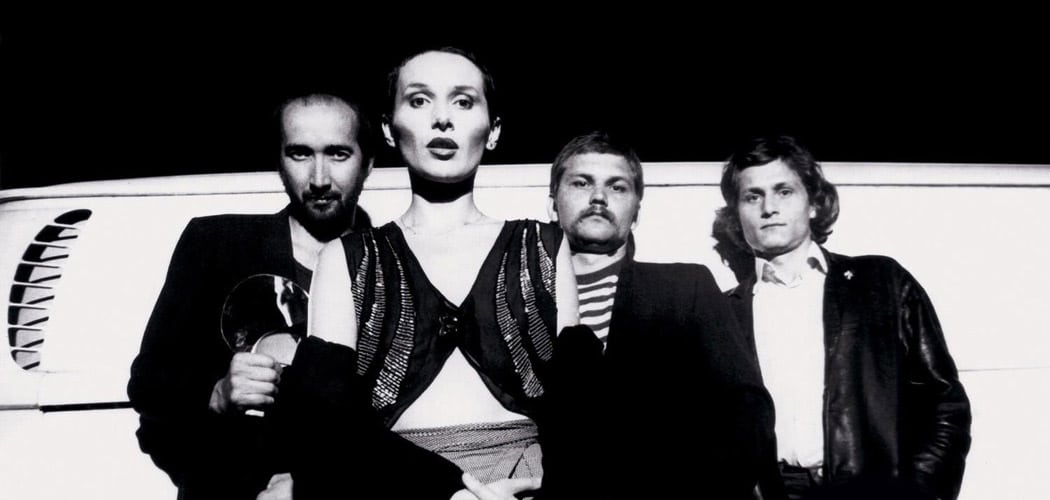
Polish Rock Under Communism: Resistance, Censorship, and Defiance
Poland under communism experienced censorship and state control of the music industry, but never as fully as in the USSR. Protests and worker uprisings, sometimes at great cost to demonstrators, kept authorities wary and forced them to permit more cultural expression than elsewhere in the Eastern Bloc. Officials, for their part, justified their relative leniency […]
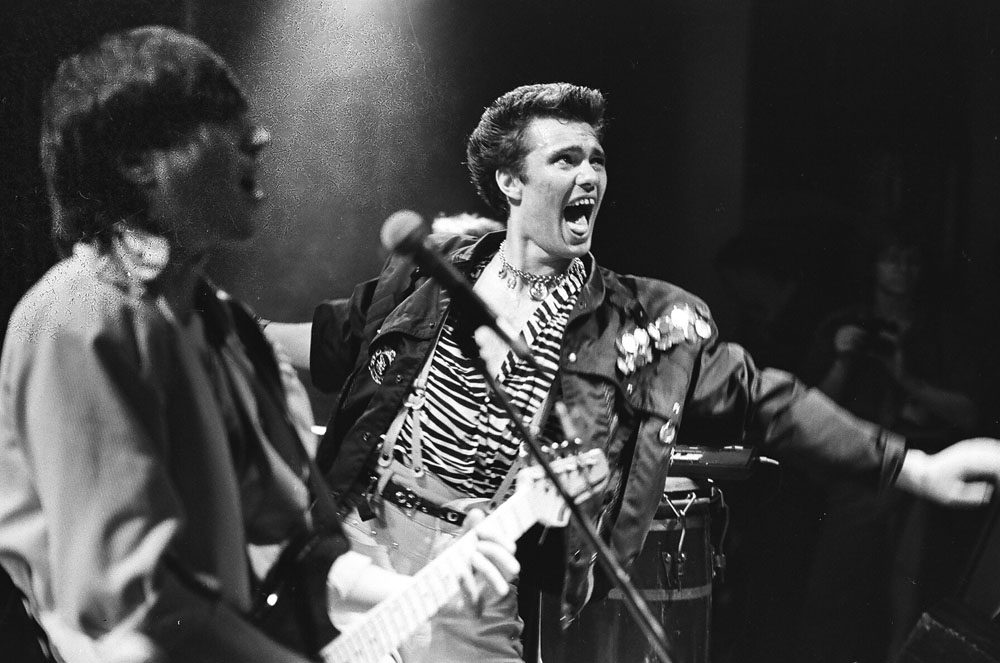
Music To Fall For: The Soviet Rock Revolution
The USSR did its best to control culture and make it serve the needs of the state. However, culture, like life itself, finds a way of spreading, evolving, and surviving, often against all odds. Rock music had, by the 60s and 70s, become a cultural phenomenon in Europe and America and its spread to the […]
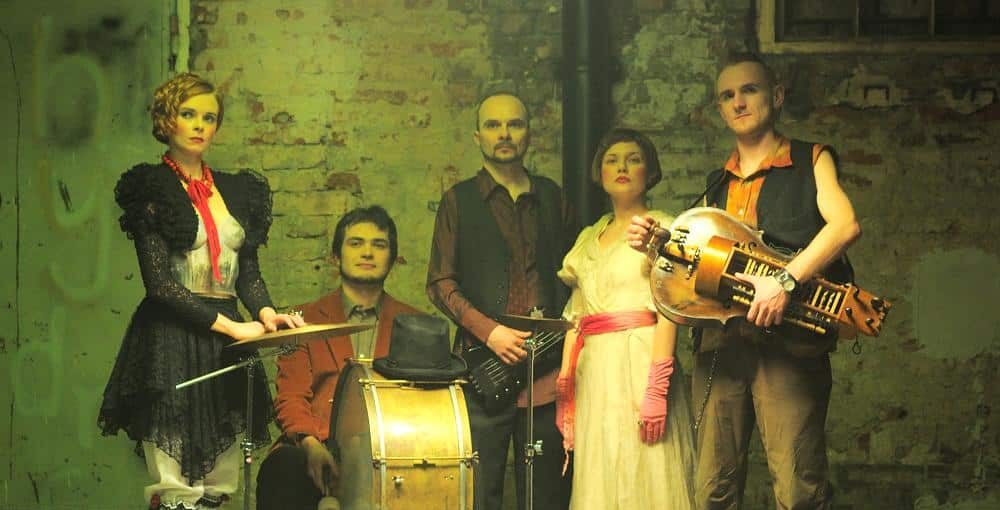
Żywiołak: Pagan Rock from Poland with a Modern Mindset
Żywiołak, initially formed in Warsaw in 2005, is a Polish folk rock band steeped in mythos. Its name references the Elemental, a magical being said to harness the power of nature in the form of air, fire, water, or earth. Their lyrics sing of epic battles (in Wojownik, or Warrior) and explore the traditions of […]

The Hu: Mongolian Folk Metal
It is not typical for a Mongolian Folk-Metal Band to take the world by storm, but that is exactly what the Ulaanbaatar-grown metal band The Hu has done. After forming in 2016, they gained global recognition in 2018, mostly through the power of word-of-mouth and YouTube. The Hu’s first two singles, “Yuve Yuve Yu” and […]

5 Bands Bringing Traditional Kazakh Style to Modern Rock
Here are five Kazakh bands working to bring traditional Kazakh instrumentation and musical styles into modern music. Roksonaki Seamless Kazakh Folk Rock Roksonaki is a Kazakh band that was formed in 2006. Its name means “lightning” in Kazakh, chosen to represent the band’s energetic and electrifying musical style. They are known for their unique fusion […]


